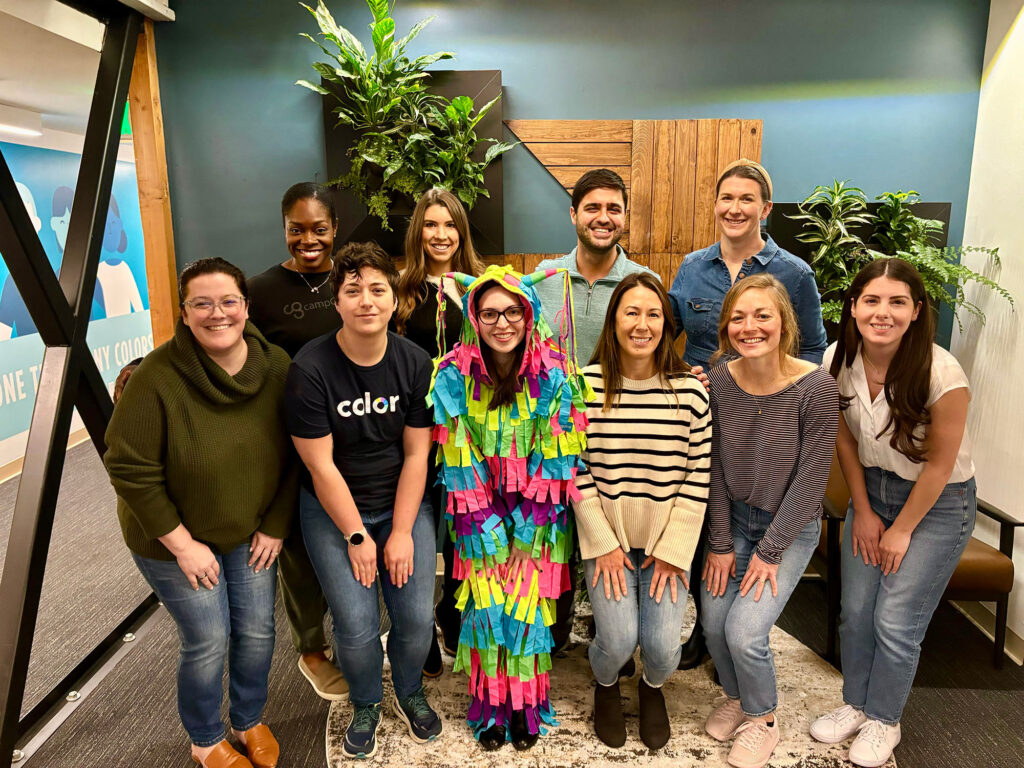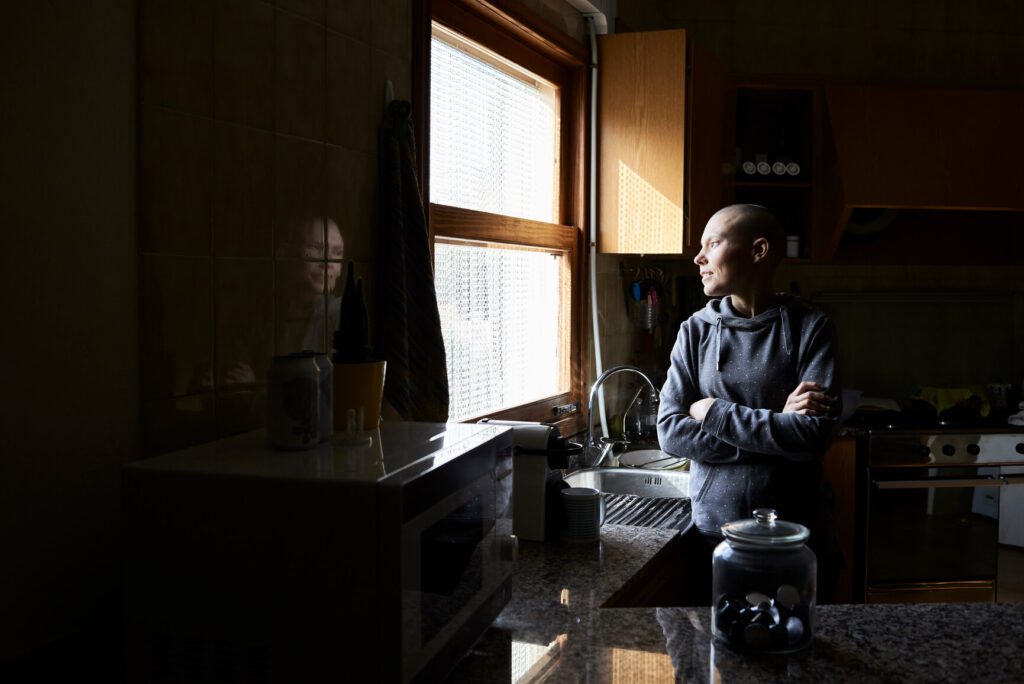News & Articles
What to know for Ovarian Cancer Awareness Month – Color
Stephanie Goettl
How do genes impact ovarian cancer risk?
As a genetic counselor, it can be difficult to explain to someone when they should have genetic testing. Cancer is so common; it seems like almost everyone has it somewhere in their family. While ovarian cancer can be rare, the guidelines for genetic testing for hereditary ovarian cancer are simple: if you, or anyone in your family, has a history of ovarian cancer, genetic testing is recommended¹. Ideally, testing would start with the person who has had ovarian cancer, since they are the most likely person to have a genetic change, which is called a mutation, that caused the cancer, if there is one to be found in the family.
Studies have shown that up to 24% of ovarian cancers are due to an inherited mutation². This is a lot higher than other types of cancers, where on average only about 5–10% are due to inherited causes. That’s why it’s such an easy decision to consider testing anyone with a personal or family history of ovarian cancer. However, often times the relatives who have had ovarian cancer have passed away, and that is when we consider genetic testing for their close relatives.
If ovarian cancer runs in my family, who should consider genetic testing?
Genetic testing is a really powerful tool, but the results can be confusing to interpret, so let’s work through an example. Say that your paternal grandmother passed away from ovarian cancer. There’s no one else in the family with cancer, and you and your siblings have been talking about genetic testing because you read this amazing blog post about it. Your dad is actually a little bit better person to start with the testing, since he’s more closely related to the person who had the cancer, and therefore, more likely to have a mutation.
Even though men don’t have any ovaries, genetic testing is still super important for them, because there are other cancers that can be increased in males, such as prostate cancer or male breast cancer. Men are equally as likely as women to have these genetic mutations, yet they make up only about 10% of who I see in my genetics clinic! Something doesn’t add up with that.
Back to your dad’s genetic testing…We need to figure out what to test dad for. When it comes to ovarian cancer, there are close to 20 different genes that have been discovered to be linked to ovarian and other cancer risks. Mutations in the BRCA1 and BRCA2 genes are the most common hereditary cause of ovarian cancer. These mutations are associated with up to a 69–72% lifetime risk of breast cancer, and up to a 17–44% lifetime risk of ovarian cancer³. There is also an elevated risk of male breast cancer, prostate cancer, and pancreatic cancer. These are not the only important genes to test for ovarian cancer. If you only test for BRCA1 and BRCA2, there is a good chance you could completely miss another genetic increased risk for cancer in the family. For example, mutations in the BRIP1 gene can increase a woman’s risk of ovarian cancer up to 8% in the lifetime. Mutations in the RAD51C and RAD51D genes can increase the risk up to 6–9%. These are still very important risks to know about, because there are things that can be done to reduce the risk of ovarian cancer. A good option for dad would be a comprehensive cancer panel, or at least a panel focused on a large number of ovarian cancer risk genes.
What happens when the test results come back?
Your dad had the genetic testing and he came back positive for a mutation. Now you and your siblings should have genetic testing, and your results will either be positive or negative. Given that your dad passes down half of his genes to each child, there’s a 50% chance for you to test positive. If you do test positive, you’ll have a better idea of your lifetime risk for ovarian cancer, and can choose to take preventative steps, such as having surgery to remove the ovaries and fallopian tubes (typically done after child-bearing years). You may also choose to talk with your doctor about taking birth control pills, since birth control pills can also reduce the risk of ovarian cancer. If you test positive, then you can also be followed more carefully for other cancers associated with the gene mutation. If your dad tests positive and you test negative, then that’s great news! That means you did not inherit what caused the ovarian cancer in the family and your risks are closer to general population risk.
On the other hand, if your dad has genetic testing and comes back negative, then you and your siblings may not need to do genetic testing. Gene mutations never “skip” a generation, If there’s no cancer on your mother’s side, there’s a low chance that you would have a mutation. Despite your dad’s negative test result, if there’s ovarian cancer in the family, you still may want to talk about family history with your doctor. Ask about the pros and cons of birth control pills to reduce your ovarian cancer risk, as well educating yourself on the symptoms of ovarian cancer. Symptoms include bloating, abdominal or lower back pain, changes in urination or bowel movements, and feeling full quickly after eating. I know what you’re thinking: “I can get these symptoms after eating too much for dinner!” You’re right, these can occur for many different (and usually benign) reasons. But it’s very important that if these symptoms persist, you should bring them up to your doctor. It’s better to speak up, rather than ignoring signs that could turn into something serious.
As September, Ovarian Cancer Awareness Month, comes to an end, I hope that you have a better understanding of how genetic testing can help you understand your risks. If there is ovarian cancer in your family, take the next steps to talk to your doctor or a genetics expert. Figure out if you or other family members need genetic testing to help clarify your risks, and hopefully reduce your risk of cancer as much as possible.
Stephanie Goettl is a board certified genetic counselor with Arizona Oncology. Stephanie received a B.S. in Molecular Biosciences and Biotechnology from Arizona State University in 2008, and a M.S. in genetic counseling from University of Minnesota in 2013. Previously, she has worked as a pediatric genetic counselor at Phoenix Children’s Hospital. Stephanie’s genetic counseling philosophy is patient-centered, and focused on helping people better understand their cancer risks and the options and implications of genetic testing results. She is passionate about taking care of the whole family so that as many people can benefit from the information as possible. Along with other local genetic counselors, Stephanie is involved in several support groups for individuals with inherited cancer risk. She is also on the board of Teal it Up, Ovarian Cancer Foundation, where she works to educate the community on symptoms of ovarian cancer and the importance of genetic counseling and testing.
- National Comprehensive Cancer Network. Genetic/Familial High-Risk Assessment: Breast and Ovarian. NCCN Guidelines Version 2.2019. Available at www.nccn.org. Published July 2018.
- Walsh, T., Casadei, S., Lee, M. K., Pennil, C. C., Nord, A. S., Thornton, A. M., … & Norquist, B. (2011). Mutations in 12 genes for inherited ovarian, fallopian tube, and peritoneal carcinoma identified by massively parallel sequencing. Proceedings of the National Academy of Sciences, 201115052.
- Kuchenbaecker KB, Hopper JL, Barnes DR, et al. Risks of breast, ovarian, and contralateral breast cancer for BRCA1 and BRCA2 mutation carriers. JAMA 2017; 317(23):2402–2416.



